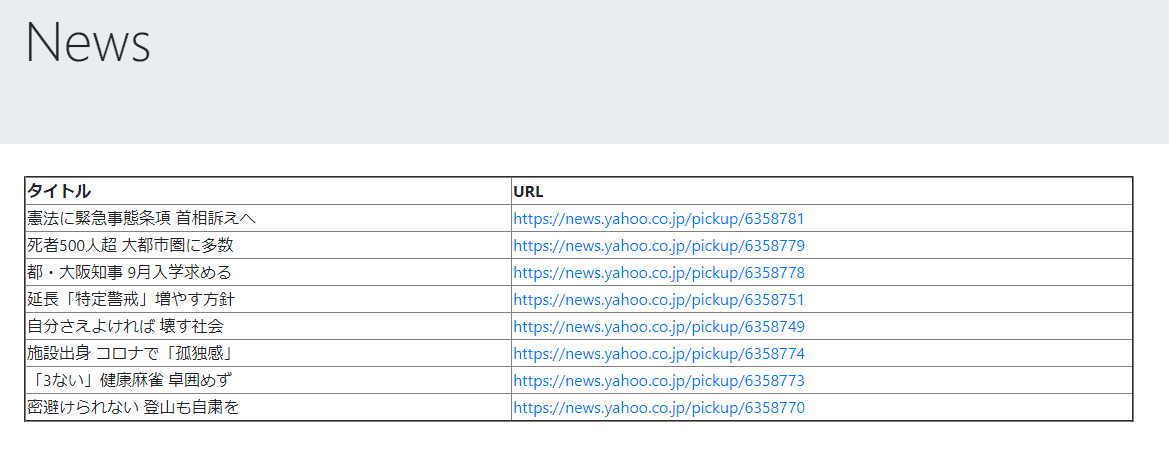
python:WEBアプリを作ろう(djangoでスクレイピング)
今回は、pythonのWebフレームワークのdjangoを使って、YahooNewsのURLを入力すれば、そのURLに記載されているタイトルとURLを抽出し、違うページに簡単にタイトルとURLを表示するような無意味なWebアプリを作ってみましょう。


projectの作成
django-admin startproject newsproject .アプリの作成
python3 manage.py startapp newsapp
templatesフォルダの作成

※manage.pyが存在するフォルダに作成。後ほど、このフォルダにURLオブジェクトを作るためのページと情報を表示するためのページ。bootstapを使うためのhtmlを作成し、入れ込みます。
newsprojectのsetting.pyの編集
INSTALLED_APPS = [
'django.contrib.admin',
'django.contrib.auth',
'django.contrib.contenttypes',
'django.contrib.sessions',
'django.contrib.messages',
'django.contrib.staticfiles',
'newsapp', #追記
]作ったアプリ名を追記します。
TEMPLATES = [
{
'BACKEND': 'django.template.backends.django.DjangoTemplates',
'DIRS': [BASE_DIR, 'templates'], #追記
'APP_DIRS': True,
'OPTIONS': {
'context_processors': [
'django.template.context_processors.debug',
'django.template.context_processors.request',
'django.contrib.auth.context_processors.auth',
'django.contrib.messages.context_processors.messages',
],
},
},
]BASE_DIRは、manage.pyがあるフォルダを示し、その中のtemplatesフォルダをTEMPLATESとみなすような設定です。
newsprojectのurls.pyの編集
from django.contrib import admin
from django.urls import path, include#追記
urlpatterns = [
path('admin/', admin.site.urls),
path('', include('newsapp.urls')), #追記
]localhost:8000にアクセスするとnewsapp.urlsを見に行くような設定です。
アプリフォルダにurls.pyを作成し、編集
from django.urls import path
from .views import Create, listfunc
urlpatterns = [
path('', Create.as_view(), name='home'),
path('list/', listfunc, name='list'),
]
localhost:8000にアクセスされた場合、Createクラスが実行され、localhost:8000/list/にアクセスすると listfuncが実行されるような設定です。
Createクラスとlistfuncは後で作成します。
アプリフォルダのviews.pyを編集
from django.shortcuts import render
from .models import News
from django.views.generic import CreateView
from django.urls import reverse_lazy
import urllib.request
import requests
from bs4 import BeautifulSoup
class Create(CreateView):
template_name = 'home.html'
model = News
fields = ('url',)
success_url = reverse_lazy('list')
def listfunc(request):
for post in News.objects.all():
url = post.url
list = []
response = requests.get(url)
bs = BeautifulSoup(response.text, "html.parser")
ul_tag = bs.find_all(class_="topicsList_main")
for tag in ul_tag[0]:
title = tag.a.getText()
url2 = tag.a.get("href")
list.append([title, url2])
context = {'list': list,}
return render(request, 'list.html', context)
Createクラスでフォームから受け取ったurlオブジェクトを作成し、lisufuncで
そのurlオブジェクトを使ってスクレイピングしています。もっと簡単な方法があると思いますが、今回は、上記のような感じで作成しました。
アプリフォルダのmodels.pyを編集
from django.db import models
class News(models.Model):
url = models.CharField(max_length=100)
マイグレーションを行う
python3 manage.py makemigrationspython3 manage.py migratebase.htmlを作成
<!doctype html>
<html lang="en">
<head>
<!-- Required meta tags -->
<meta charset="utf-8">
<meta name="viewport" content="width=device-width, initial-scale=1, shrink-to-fit=no">
<!-- Bootstrap CSS -->
<link rel="stylesheet" href="https://stackpath.bootstrapcdn.com/bootstrap/4.4.1/css/bootstrap.min.css" integrity="sha384-Vkoo8x4CGsO3+Hhxv8T/Q5PaXtkKtu6ug5TOeNV6gBiFeWPGFN9MuhOf23Q9Ifjh" crossorigin="anonymous">
<title>Pachi Data</title>
</head>
<body>
{% block header %}
{% endblock header %}
{% block content %}
{% endblock content %}
<!-- Optional JavaScript -->
<!-- jQuery first, then Popper.js, then Bootstrap JS -->
<script src="https://code.jquery.com/jquery-3.4.1.slim.min.js" integrity="sha384-J6qa4849blE2+poT4WnyKhv5vZF5SrPo0iEjwBvKU7imGFAV0wwj1yYfoRSJoZ+n" crossorigin="anonymous"></script>
<script src="https://cdn.jsdelivr.net/npm/popper.js@1.16.0/dist/umd/popper.min.js" integrity="sha384-Q6E9RHvbIyZFJoft+2mJbHaEWldlvI9IOYy5n3zV9zzTtmI3UksdQRVvoxMfooAo" crossorigin="anonymous"></script>
<script src="https://stackpath.bootstrapcdn.com/bootstrap/4.4.1/js/bootstrap.min.js" integrity="sha384-wfSDF2E50Y2D1uUdj0O3uMBJnjuUD4Ih7YwaYd1iqfktj0Uod8GCExl3Og8ifwB6" crossorigin="anonymous"></script>
</body>
</html>
※boostrapのStarterTemplateを貼り付け、bodyの中にblock headerとblock contentを追記しています。
home.htmlを作成
{% extends 'base.html' %}
{% block header %}
<div class="jumbotron">
<div class="container">
<h1 class="display-4">News</h1>
<p class="lead">Enter the URL</p>
</div>
</div>
{% endblock header %}
{% block content %}
<div class="container">
<form action='' method='POST'>{% csrf_token %}
<p>URL: <input type="text" name='url'></p>
<input type="submit" value="取得する">
</form>
</div>
{% endblock content %}URLオブジェクトを作成するためのトップページです。
list.htmlを作成
{% extends 'base.html' %}
{% block header %}
<div class="jumbotron">
<div class="container">
<h1 class="display-4">News</h1>
</div>
</div>
{% endblock header %}
{% block content %}
<div class="container">
<ul class="list-group list-group-flush">
<table border="2">
<tr>
<th>タイトル</th>
<th>URL</th>
</tr>
{% for post, post2 in list %}
<tr>
<td>{{ post }}</td>
<td><a href="{{ post2 }}">{{ post2 }}</a></td>
</tr>
{% endfor %}
</table>
</ul>
</div>
{% endblock content %}データを表示させるためのページです。
以上で完成となります。以下のコードでサーバーを起動して、確認してみてください。
python3 manage.py runserver最終的な構成は以下のような感じです。

